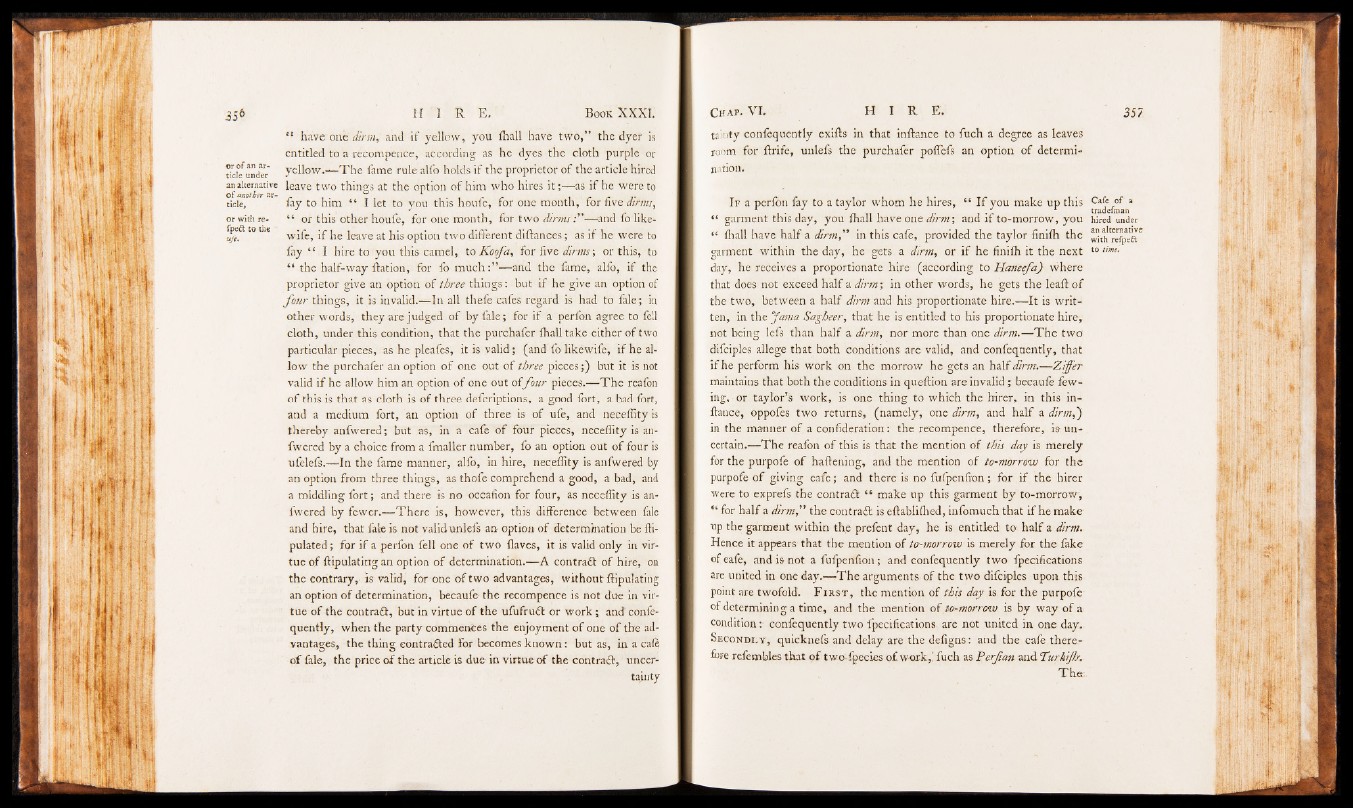
ft have on£ dirm, and if yellow, you fhall have two,” the dyef is
entitled to a recompenee, according as he dyes the cloth purple or
tic?/under" y e^°w.— The fame rule alfo holds if the proprietor of the article hired
an alternative leave two things at the option of him who hires i t ;— as if he were to
tide , fay to him “ I let to you this houfe, for one month, for five dirms,
or with re- “ or this other houfe, for one month, for two d irm s— and fo like-
jpeft to the wp-e^ jp jje jeav-e at jjis option two different diftances; as i f he were to
fay “ I hire to you this camel, XaKoofa, for five dirms; or this, to
P the half-way ftation, for fo much:”— and the fame, alfo, if the
proprietor give an option of three things: but if he give an option of
Jour things, it is invalid.— In all thefe cafes regard is had to fale; in
other words, they are judged of by fale; for if a perfon agree to fell
cloth, under this condition, that the pUrchafer fhall take either of two
particular pieces, as he pleafes, it is valid; (and fo likewife, if he allow
the purchafer an option o f one out of three pieces;) but it is not
valid i f he allow him an option of one out offour pieces.— T h e reafon
of this is that as cloth is of three defcriptions, a good fort, a bad fort,
and a medium fort, an option of three is of ufe, and neceffity is
thereby anfwered; but as, in a cafe of four pieces, neceffity is an-
fwered by a choice from a fmaller number, fo an option out of four is
ufelefs.— In the fame manner, alfo, in hire, neceffity is anfwered by
an option from three things, as thofe comprehend a good, a bad, and
a middling fort; and there is no occafion for four, as neceffity is anfwered
by fewer.— There is, however, this difference between fale
and hire, that fale is not valid unlefs an option of determination be ffi-
pulated; fijr if a perfon fell one of two Haves, it is valid only in virtue
of ftipulating an option of determination.— A contrail of hire, on
the contrary, is valid, for one of two advantages, without ftipulating
an option of determination, becaufe the recompenee is not due in virtue
of the contrail, but in virtue of the ufufruil or work ; and confe-
quently, when the party commences the enjoyment of one of the advantages,
the thing eontraited For becomes known: but as, in a cafe
of fale, the price of the article is due in virtue of the contrail, uncertainty
tainty confequently exifts in that inftance to fuch a degree as leaves
room for flrife, unlefs the purchafer pofiefs an option of determination.
I f a perfon fay to a taylor whom he hires, “ I f you make up this
“ garment this day, you fhall have one dirm; and if to-morrow, you
“ fhall have half a dirm,” in this cafe,, provided the taylor finifh the
garment within the day, he gets a dirm, or if he finifh it the next
day, he receives a proportionate hire (according to Haneefa) where
that does not exceed half a dirm; in other words, he gets the leaf! of
the two, between a half dirm and his proportionate hire.— It is written,
in the Jama Sagheer, that he is entitled to his proportionate hire,
not being lefs than half a dirm, nor more than one dirm.— The two
difciples allege that both conditions are valid, and confequently, that
if he perform his work on the morrow he gets an half dirm.— Zijfer
maintains that both the conditions in queftion are invalid; becaufe few-
ing, or taylor’ s work, is one thing to which the hirer, in this in-
flance, oppofes two returns, (namely, one dirm, and half a dirm,')
in the manner of a confederation: the recompenee, therefore, is- uncertain.—
The reafon o f this is that the mention of this day is merely
for the purpofe of haftening, and the mention of to-morrow for the
purpofe o f giving eafe; and there is no fufpenfion; for if the hirer
were to exprefs the contrail “ make up this garment by to-morrow,
for half a dirm,” the contrail is eftablifhed, infomuch that if he make
up the garment within the prefent day, he is entitled to half a dirm.
Hence it appears that the mention of tcr-morrow is merely for the fake
of eafe, and is not a fufpertfion ; and confequently two fpecifications
are united in one day.-r-.The arguments of the two difciples upon this
point are twofold. F i r s t , the mention of this day is for the purpofe
of determining a time, and the mention o f to-morrow is by way of a
condition :■ confequently two fpecifications are not united in one day.
S e c o n d l y , quicknefs and delay are the defigns: and the cafe therefore
refembles that of two-fpecies of work,! fuch as Perjan and Purkijh.
The-.
Cafe o f a
tradefman
hired under
an alternative
with refpeft
to time.